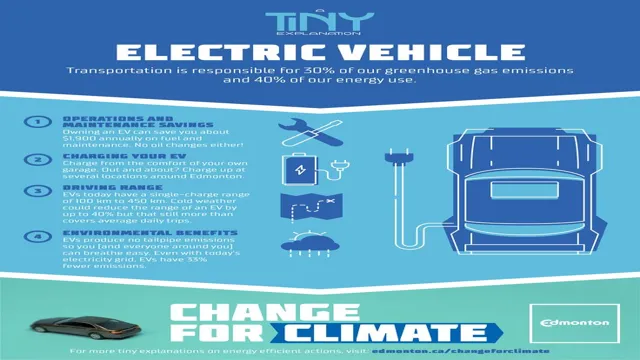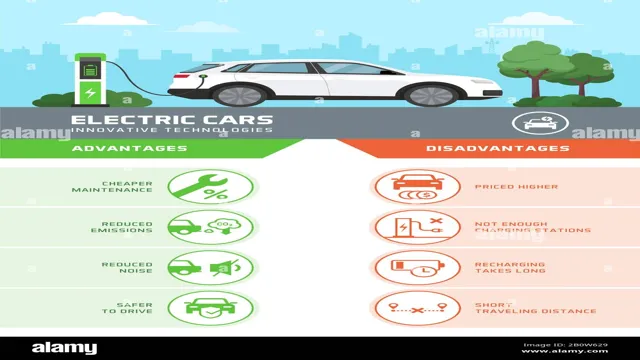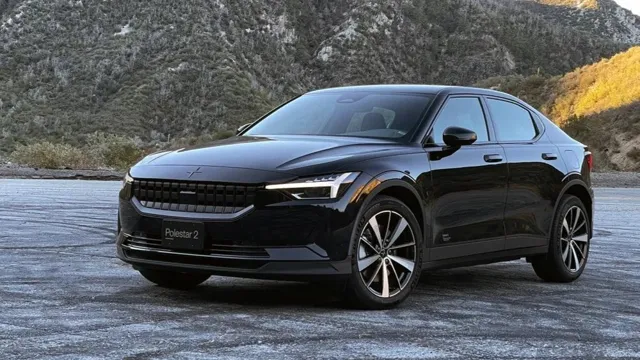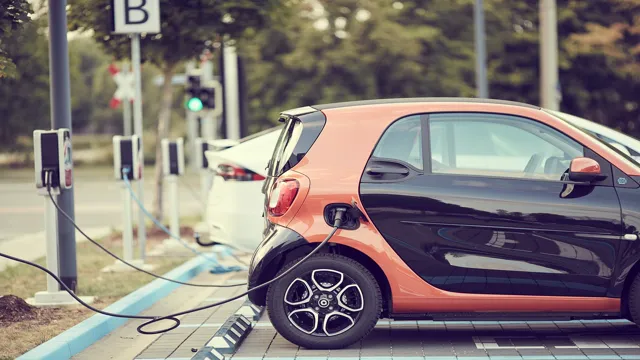Charging Toward a Greener Future: The Environmental Benefits of Electric Cars
Have you ever wondered how electric cars impact the environment? As the world becomes more conscious about climate change, electric cars have emerged as one of the most promising solutions. These cars are designed to reduce carbon emissions and provide a more sustainable mode of transportation. Not only do they help reduce pollution levels, but they also offer numerous benefits such as reduced fuel costs, quieter rides, and smoother driving experiences.
In this blog, we will dive deeper into the environmental advantages of electric cars and understand how they are helping us create a greener future.
Environmental Impact of Gasoline Cars
Electric cars have become increasingly popular in recent years due to their many environmental benefits. Unlike gasoline cars, which emit harmful pollutants, electric cars run on electricity, producing zero emissions. This not only helps to improve air quality and reduce the risk of respiratory illnesses, but it also helps to combat climate change by reducing greenhouse gas emissions.
In addition, electric cars are much more energy-efficient than gasoline cars, meaning that a greater proportion of the energy produced can be used to actually power the car, rather than being lost as heat. While electric cars are still more expensive than their gasoline counterparts, the cost of electric cars is expected to continue to decrease as technology advances and more people adopt them, making them an increasingly attractive option for environmentally-conscious drivers. So, by making the switch to an electric car, you can not only help to protect the environment, but you can also save money on fuel costs in the long run.
Pollution from Exhaust Emissions
Gasoline cars are convenient for getting us from point A to point B, but they come with some serious environmental consequences. The exhaust emissions from these vehicles are a major contributor to air pollution, which can have devastating effects on both human health and the environment. The emission of pollutants such as carbon monoxide, nitrogen oxides, and particulate matter creates a hazardous cocktail that can lead to smog and toxic air quality, making it difficult to breathe and causing respiratory problems.
In addition, the carbon dioxide emissions from gasoline cars are a key contributor to climate change, which can have long-term effects on our planet and our way of life. Making the transition to electric or hybrid vehicles is one way to reduce the environmental impact of our transportation, but until we make that switch, it’s important to remember that every time we get behind the wheel of a gasoline car, we’re contributing to a problem that affects us all.
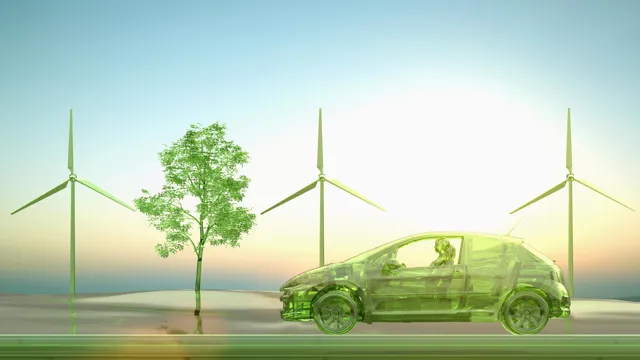
Impact on Climate Change
Gasoline cars have a significant impact on climate change due to their contribution to greenhouse gas emissions. According to the Environmental Protection Agency (EPA), transportation accounted for 28% of greenhouse gas emissions in the United States in 2018, with cars and light trucks being the largest contributing sources. Gasoline cars emit carbon dioxide, which is a potent greenhouse gas that traps heat in the atmosphere, leading to global warming.
Additionally, they release pollutants such as nitrogen oxides and particulate matter, which can contribute to respiratory problems and other health issues. While advancements in technology have led to more fuel-efficient cars, they still rely on fossil fuels and contribute to the climate crisis. Electric cars are a more environmentally responsible option, as they emit zero greenhouse gases and can be powered by renewable energy sources.
As consumers, we have the power to make a difference by choosing alternative transportation options and supporting policies that prioritize the transition to a clean energy economy.
Electric Cars: A Cleaner Alternative
Electric cars have quickly become a popular alternative to traditional gasoline-powered vehicles, and for good reason. One of the primary benefits of electric cars is their low environmental impact. Unlike gasoline cars, which emit harmful pollutants into the air, electric cars produce zero emissions at the tailpipe.
This means that they do not contribute to air pollution, which is a significant environmental concern. Additionally, electric cars are more efficient than gasoline vehicles and require less energy to travel the same distance, which further reduces their impact on the environment. In fact, studies have shown that over their lifetime, electric cars produce significantly fewer greenhouse gas emissions than gasoline cars.
By choosing an electric car, you’re choosing a cleaner and more sustainable mode of transportation that can positively impact the environment for years to come.
Zero Emissions
Electric cars are revolutionizing the way we travel while prioritizing our environment’s health. The traditional gasoline-powered vehicles have been the culprit for the significant carbon dioxide emissions in the atmosphere, leading to climate change. However, electric cars produce zero emissions, making them the best alternative to gasoline-powered vehicles.
They utilize rechargeable batteries, which can be recharged using clean energy sources, like solar and wind energy. The shift to electric cars from gasoline-powered vehicles will make a significant contribution to reducing greenhouse gas emissions, improving air quality, and fighting climate change. With advancements in electric car technology, more affordable and convenient models are becoming available, improving their accessibility to the masses and further reducing the demand for traditional gasoline-powered vehicles.
The shift to electric cars is crucial in our efforts to ensure a sustainable future for our planet.
Reduced Carbon Footprint
Electric cars have become a popular choice for individuals who want to reduce their carbon footprint. These vehicles run on electricity and emit zero greenhouse gases, so they’re much cleaner than traditional gasoline-powered cars. Not only do electric cars help the environment, but they also provide a fantastic driving experience.
Plus, you won’t have to visit the gas station as frequently, which saves money in the long run. Although electric cars have a higher upfront cost, many people believe that it’s worth it for the long-term benefits. In fact, some companies even offer tax credits for purchasing electric cars.
If you’re looking for a cleaner and more efficient alternative to traditional cars, an electric car may be right for you.
Improved Air Quality
Electric cars have been around for a while, and it has become increasingly popular among environmentally conscious individuals as a cleaner alternative to traditional gas-powered cars. The electric cars don’t produce harmful emissions, which greatly contributes to cleaner air quality, reducing air pollution, and overall greenhouse gas emissions. According to scientific studies, electric cars emit 50% less CO2 than average gas-powered vehicles, which is a significant improvement.
The reduction of tailpipe emissions creates a better environment for everyone, including children and those suffering from respiratory illness. The rise of electric cars is gradually becoming more accessible, and it eliminates the need for gas pumps, oil changes, and muffler replacements. Therefore, we can expect to see more electric cars on the road in the upcoming years.
The benefits of electric cars are numerous, here are just a few examples: reductions in urban noise pollution, air pollution, and improved respiratory health for those who live in cities. By driving an electric car, you’re helping to create a cleaner and brighter future for all of us.
Support Green Energy
Electric cars have gained widespread popularity in recent years, and for good reason. Not only do they help to reduce our carbon footprint, but they also offer a range of environmental benefits. For one, electric cars produce zero emissions, meaning they don’t release harmful pollutants into the air like traditional gasoline-powered cars do.
This can have a significant impact on reducing air pollution and improving air quality in our cities. Additionally, electric cars are more energy-efficient and require less fuel to run than traditional cars. This not only saves consumers money in the long run, but it also reduces the demand for oil and other fossil fuels.
By supporting green energy and choosing electric cars, we can all do our part to reduce our impact on the environment and create a more sustainable future for generations to come. So, why not make the switch today and start reaping the benefits of electric cars?
Electric Cars and Renewable Energy Sources
As electric cars continue to rise in popularity, it’s important to support renewable energy sources in order to fully reap the environmental benefits. By utilizing sources such as solar, wind, and hydropower, we can decrease our dependency on fossil fuels and reduce carbon emissions. Not only does this benefit the planet, but it also helps reduce our reliance on finite resources and unstable foreign oil markets.
Making the switch to electric vehicles is only one piece of the puzzle in reducing our carbon footprint – we must also commit to supporting and investing in renewable energy sources. It’s like planting a seed – by making small changes now, we can reap the benefits for decades to come. So let’s make a conscious effort to support green energy and pave the way for a sustainable future.
Reduced Dependence on Fossil Fuels
Reduced Dependence on Fossil Fuels As we continue to experience the negative impacts of climate change, there’s never been a better time to support green energy alternatives. One way to do this is by reducing our dependence on fossil fuels. Fossil fuels like coal, oil, and natural gas are not only finite resources but also major sources of greenhouse gas emissions.
By investing in renewable energy sources such as wind, solar, and hydroelectric power, we can significantly reduce our carbon footprint and help to mitigate the effects of climate change. The shift to green energy has plenty of benefits. Not only does it help us limit the carbon emissions that lead to climate change, but it also creates new job opportunities and promotes sustainable economic growth.
Furthermore, as technology continues to improve, the cost of generating renewable power is decreasing, making it an ever more viable alternative to traditional fossil fuels. It’s essential to note that the transition to green energy won’t happen overnight. It will take time, effort, and a global commitment to reducing our reliance on fossil fuels.
But by supporting green alternatives and advocating for policy changes that encourage their adoption, we can take a meaningful step towards a more sustainable future. Together, we can reduce our dependence on fossil fuels and build a cleaner, healthier planet for generations to come.
Consider Buying an Electric Car
Electric cars are a great option if you’re looking to make a positive impact on the environment. Unlike traditional gas-powered vehicles, electric cars produce zero emissions and therefore do not contribute to air pollution. This is especially important in heavily populated areas where air pollution can have a detrimental effect on public health.
Electric cars also have a lower carbon footprint than gas-powered cars because they rely on electricity that can come from renewable sources like wind and solar power. They may be more expensive up front, but the long-term cost savings from not having to pay for gas and oil changes can make them financially worth it. If you’re considering buying an electric car, it’s important to do your research to ensure it’s the right fit for your lifestyle and budget.
But with their environmental benefits, it’s worth considering making the switch.
Conclusion
In conclusion, choosing an electric car is not only a smart financial decision in the long run, but it also boasts incredible environmental benefits. By reducing emissions, improving air quality, and decreasing our reliance on fossil fuels, electric cars are paving the way towards a more sustainable future. Plus, who wouldn’t want to feel like they’re driving around in a futuristic, tech-savvy vehicle? It’s time to ditch the gas-guzzlers and embrace the electrifying benefits of driving an electric car.
As Benjamin Franklin once said, “Energy and persistence conquer all things” – and electric cars are definitely leading the charge towards a more sustainable world.
FAQs
What are the environmental benefits of using electric cars?
Electric cars produce zero emissions, reducing air pollution and greenhouse gas emissions, which are critical factors in mitigating climate change.
How much do electric cars contribute to reducing carbon emissions?
Electric cars have the potential to significantly reduce carbon emissions, with estimates showing that they could reduce global emissions by up to 1.5 billion tons per year by 2050.
Are electric cars more expensive than traditional gasoline-fueled cars?
While electric cars can have a higher upfront cost, they can also have lower operating costs over time, as they require less maintenance and the cost of electricity is generally lower than gasoline.
What is the impact of electric cars on the electricity grid?
As electric cars become more popular, they will place additional strain on the electricity grid, but advancements in energy management technologies and infrastructure investments can help mitigate this impact.

